Related Research Articles

Uppsala University (UU) is a public research university in Uppsala, Sweden. Founded in 1477, it is the oldest university in Sweden and the Nordic countries still in operation.
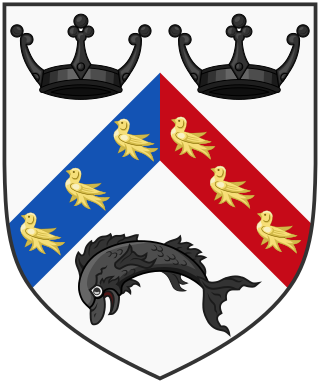
The University of Sussex is a public research university located in Falmer, East Sussex, England. It lies mostly within the city boundaries of Brighton and Hove. Its large campus site is surrounded by the South Downs National Park, and provides convenient access to central Brighton 5.5 kilometres (3.4 mi) away. The university received its royal charter in August 1961, the first of the plate glass university generation.
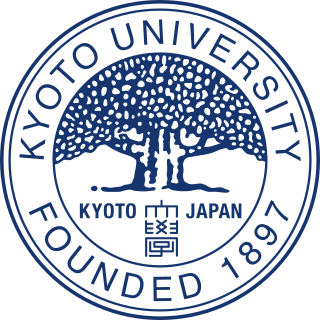
Kyoto University, or KyotoU, is a national research university located in Kyoto, Japan. Founded in 1897, it is one of the former Imperial Universities and the second oldest university in Japan.

The Royal Swedish Academy of Sciences is one of the royal academies of Sweden. Founded on 2 June 1739, it is an independent, non-governmental scientific organization that takes special responsibility for promoting natural sciences and mathematics and strengthening their influence in society, whilst endeavouring to promote the exchange of ideas between various disciplines.

Hokkaido University, or Hokudai (北大), is a public research university in Sapporo, Hokkaido, Japan. Founded in 1918, it is the fifth-oldest government-authorised university in Japan and one of the former Imperial Universities.

Lahore University of Management Sciences (LUMS) (Urdu: جامعۂ لاہور برائے علومِ انتظامیات) is a Social Enterprise & Research university, located in Lahore, Punjab, Pakistan.

Novosibirsk State University is a public research university located in Novosibirsk, Russia. The university was founded in 1958, on the principles of integration of education and science, early involvement of students with research activities and the engagement of leading scientists in its teaching programmes.

The University of Brasília is a federal public university in Brasília, the capital of Brazil. It was founded in 1960 and has since consistently been named among the top five Brazilian universities and the top fifteen universities in South America by Times Higher Education (THE).

The presence of women in science spans the earliest times of the history of science wherein they have made significant contributions. Historians with an interest in gender and science have researched the scientific endeavors and accomplishments of women, the barriers they have faced, and the strategies implemented to have their work peer-reviewed and accepted in major scientific journals and other publications. The historical, critical, and sociological study of these issues has become an academic discipline in its own right.
Prince Abubakar Audu University,(Formerly Kogi State University) located at Anyigba, is a state-owned university of Kogi, Nigeria. It was established in 1999 by Prince Abubakar Audu, the former governor of the state. At the time of its establishment, it was known as Kogi State University, It was later renamed Prince Abubakar Audu University (PAAU) in 2020, after the then sitting governor of Kogi State, who heralded its establishment, and later renamed Kogi State University (KSU) in 2003 by the former governor Ibrahim Idris and subsequently renamed as Prince Abubakar Audu University in 2020 by Governor Alhaji Yahaya Adoza Bello in respect of late Abubakar Audu.

Khulna University of Engineering & Technology, commonly known as KUET, formerly BIT Khulna, is a public technological university located in Khulna, Bangladesh. It emphasizes education and research in engineering and technology. It was founded in 1967 as an engineering college before gradually converting into a university.

The National Institute of Science Education and Research (NISER) is a public research institute in Bhubaneswar, Odisha, India, under the umbrella of the Indian Department of Atomic Energy. The institute is affiliated with Homi Bhabha National Institute. Prime Minister Manmohan Singh, laid the foundation stone on August 28, 2006. Government of India earmarked an initial outlay of ₹823.19 crore (US$100 million) during the first seven years of the project, starting in September 2007. It was ranked second in the country by the Nature Index 2020.

Sokoine University of Agriculture (SUA) is a public university in Morogoro, Tanzania, specializing in agriculture. The university is named after the country's second prime minister Edward Sokoine.
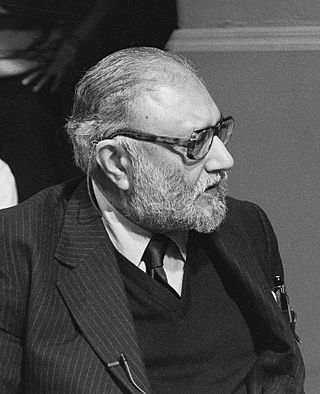
Science and technology is a growing field in Pakistan and has played an important role in the country's development since its founding. Pakistan has a large pool of scientists, engineers, doctors, and technicians assuming an active role in science and technology. The real growth in science in Pakistan occurred after the establishment of the Higher education Commission in 2002 which supported science in a big way and also became the major sponsor of the Pakistan Academy of Sciences under the leadership of Prof. Atta-ur-Rahman. The emphasis was placed on quality rather than numbers during this period. The quality measures introduced by Prof. Atta-ur-Rahman as Founding Chairman HEC included:1) All Ph.D. thesis were evaluated by eminent foreign scientists,2) All PhD theses and research papers were checked for plagiarism 3) Some 11,000 students were sent abroad to leading universities for PhD level training and absorbed on their return, 4) Appointments at faculty positions were linked to international stature of the applicants as judged from their international publications, patents and citations, and (5) Quality Enhancement Cells were established in all universities for the first time in the history of the country. (6) The minimum criteria for establishment of a new university were approved by the Cabinet and universities that did not meet these criteria were closed down. (7) The Model University Ordinance was approved setting the governance parameters for new universities. (8) A list of fake higher education institutions was prepared and made public. (9) Quality Assurance Agency (QAA) was set up within the Higher Education Commission that established Quality Enhancement Cells (QECs) as its operational units in public and private-sector universities across the country. (10) The funding of universities was linked to excellence in teaching and research under a formula based funding mechanism that considered enrolment, subjects and quality of teaching and research. The first IT policy and implementation strategy was approved under the leadership of Prof. Atta-ur-Rahman, then Federal Minister of Science & technology, in August 2000 which laid the foundations of the development of this sector On the request of Prof. Atta-ur-Rahman, Intel initiated a nationwide programme to train school teachers in Information and Communication technologies in March 2002 which has led to the training of 220,000 school teachers in 70 districts and cities across Pakistan. A 15-year tax holiday was approved on the recommendation of Prof. Atta-ur-Rahman which has resulted in growth of IT business from $30 million in 2001 to over $3 billion. The Pakistan Austria University of Applied Engineering (Fachhochschule) has been established in Haripur Hazara under a Steering Committee Chaired by Prof. Atta-ur-Rahman in which students will get degrees from several Austrian universities. Pakistan's growth in scientific output can be seen from the fact that in 1990 Pakistan published 926 scholarly documents while in 2018 the number rose to 20548, a twenty times increase.In contrast India published 21443 scholarly documents in 1990 and the number rose to 171356 in 2018, an eight times increase. In 2018, 336 people per million were researchers in the R&D in Pakistan compared to 256 people per million being researchers in India. The reforms begun by Prof. Atta-ur-Rahman FRS in 2003-2008 have continued over the subsequent decade and according to the Web of Science report, there was a 300% growth in research publications in 2019 over the decade, with 2019 marking the first year in which Pakistan was ranked above the world average in research. In 2019, Pakistan produced 300% more publications indexed in the Web of Science Core Collection than in 2010. In the decade of 2010-2019, more than half of Pakistan’s research was published in journals with Impact Factor. The global influence of Pakistan’s research is increasing as scientists in the country are publishing more in top quartile journals. The Category Normalized Citation Impact of Pakistan’s publications has risen from 0.67 to 1.03. output. As of 2020, Pakistan has 85% teledensity with 183 million cellular, 98 million 3G/4G and 101 million broadband subscribers, due to the foundations laid by Prof. Atta-ur-Rahman of the IT and telecom industry during 2000-2008. In an analysis of scientific research productivity of Pakistan, in comparison to Brazil, Russia, India and China, Thomson Reuters has applauded the developments that have taken place as a result of the reforms introduced by Prof. Atta-ur-Rahman FRS, since Pakistan has emerged as the country with the highest increase in the percentage of highly cited papers in comparison to the "BRIC" countries
A Doctor of Philosophy is the most common degree at the highest academic level, awarded following a course of study and research. The degree is abbreviated PhD and sometimes, especially in the U.S., as Ph.D. It is derived from the Latin Philosophiae Doctor, pronounced as three separate letters.
AGORA is the acronym for the Access to Global Online Research on Agriculture program. It was launched in 2003 by the Food and Agriculture Organization of the United Nations (FAO) in partnership with Cornell University and up to 70 of the world's leading science publishers, to provide free or low-price online access to leading peer-reviewed publications in agriculture and related biological, environmental and social sciences to more than 100 lower-income countries.
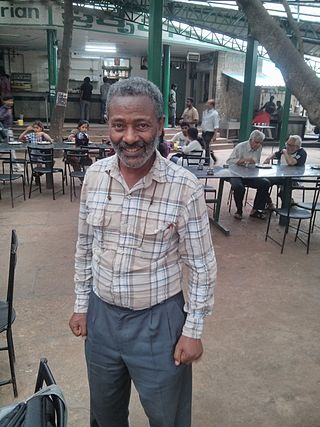
Mulugeta Bekele is an Ethiopian scientist and academic. He is an associate Professor of Physics at Addis Ababa University (AAU), Ethiopia. He completed his PhD in Physics at the Indian Institute of Science, Bangalore, India in 1997. He has been awarded the Andrei Sakharov Prize by the American Physical Society (APS) "For tireless efforts in defense of human rights and freedom of expression and education anywhere in the world, and for inspiring students, colleagues and others to do the same." He is the president of Ethiopian Physical Society since October 1998 and an Associate Member of the Abdus Salam International Centre for Theoretical Physics, Trieste, Italy since May 1999.
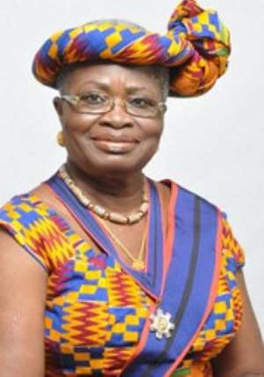
Marian Ewurama Addy was a Ghanaian biochemist and the first Host of the National Science and Maths Quiz. The first Ghanaian woman to attain the rank of full professor of natural science, Addy became a role model for school girls and budding female scientists on the limitless opportunities in science, technology, engineering and mathematics (STEM) disciplines. Marian Addy was also a Fellow of the Ghana Academy of Arts and Sciences, elected in 1999. In the same year, she was awarded the UNESCO Kalinga Prize for the Popularization of Science.
Dipankar Das Sarma, popularly known as D.D. Sarma, is an Indian scientist and structural chemist, known for his researches in the fields of Solid State Chemistry, Spectroscopy, Condensed Matter Physics, Materials Science, and Nanoscience. He is a former MLS Chair Professor of Physics and Chairman of the Centre for Advanced Materials and the GAST Professor of Uppsala University, Sweden, A recipient of TWAS Physics Prize and the UNESCO Biennial Javed Husain Prize, Sarma was honored by the Council for Scientific and Industrial Research (CSIR), Government of India, in 1994, with the Shanti Swarup Bhatnagar Prize for Science and Technology.

Kristina Edström is a Swedish Professor of Inorganic Chemistry at Uppsala University. She also serves as Head of the Ångström Advanced Battery Centre (ÅABC) and has previously been both Vice Dean for Research at the Faculty of Science and Technology and Chair of the STandUp for Energy research programme.
References
- ↑ "International science programme, Uppsala university, 1961-2001". Lindqvist, Torsten. Acta Universitatis Upsaliensis. 2001.
{{cite journal}}: Cite journal requires|journal=(help)CS1 maint: others (link) - ↑ "International science programme (ISP) annual report to Sida 2011" (PDF).
- ↑ Sundin, Peter (2013). "The International Programme in the Chemical Sciences (IPICS): 40 Years of Support to Chemistry in Africa". Chemistry for Sustainable Development in Africa. Springer, Berlin, Heidelberg. pp. 215–230. doi:10.1007/978-3-642-29642-0_11. ISBN 9783642296413.